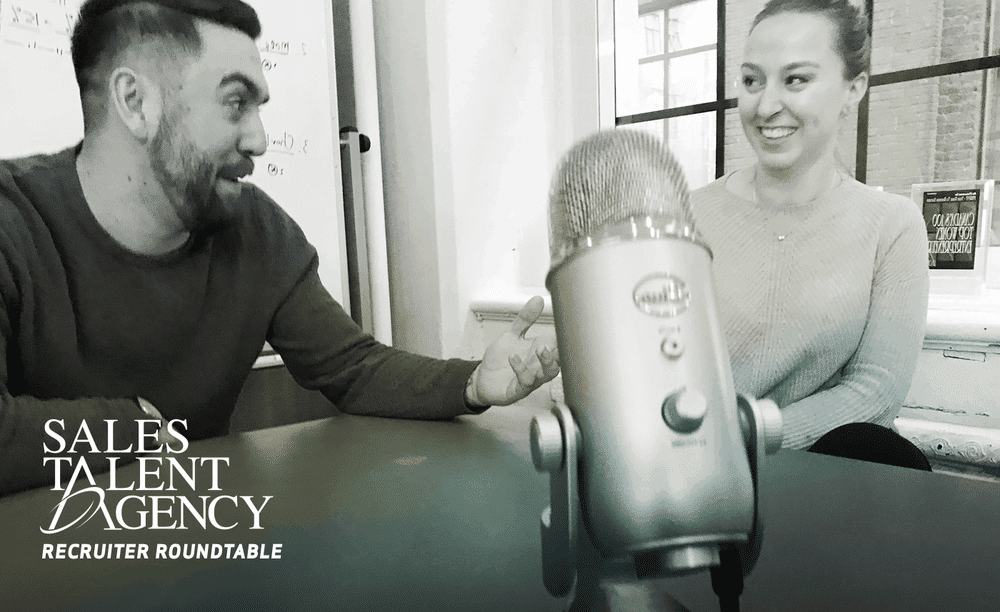Today’s business world can be really confusing when managing your career. How to meet potential employers? How to dress for an interview? How to negotiate your offer or a raise? All of these topics and more are discussed in our Recruiter Roundtable series, where we invite a diverse group of Sales Talent Agents to share their ideas and debate the topics important to you. In today’s roundtable we discuss best practices of curating your Linkedin profile (and other social media accounts) when it comes to landing your next sales job.
 Chelsea and Dan discuss when it is and is not appropriate to share radical political views in the job hunt. Spoiler alert: Never. In today’s panel: Jamie, Katherine, Dan, Ali, Sheila, Emily, Chelsea
Chelsea and Dan discuss when it is and is not appropriate to share radical political views in the job hunt. Spoiler alert: Never. In today’s panel: Jamie, Katherine, Dan, Ali, Sheila, Emily, Chelsea
Choose a photo that reflects the role you have (or aspire to have)
Jamie: So this is the situation: we have a candidate who wants to give themselves the best opportunity to get noticed by an employer. They are looking at their online presence and have to figure out what they need to do to give themselves the best opportunity to not only be seen but be attractive to a future company. Let’s start with LinkedIn. What are we recommending?
Ali: Let’s start with the photo. This is your opportunity to give people a 10 second snapshot of who you are. Is your image posed, candid, with friends or corporate? I’d say definitely no selfies. My preference goes to those with professional style headshots on a dark background- I think it makes your features pop. Also someone who looks welcoming- this isn’t a passport photo! Overall, I feel like someone’s picture dictates the type of encounter you are going to have with them– I usually can get a pretty accurate reading of someone this way.
Katherine: I have a different perspective on this as I interact primarily with students. A lot of them have group photos or selfies which aren’t typically professional but we give them a call and they are great.
Chelsea: That said, it still detracts from the overall experience. I think you need a balance; you need to dress for the job you’re looking for. So, if you’re looking for a corporate job you should look a little more corporate in appearance and not too casual.
Write in first person (you’re not fooling anyone with that third person bio)
Dan: I’m always confused whether or not people should write in third person or first person. If you write in third person it gives me the impression, especially if you’re a Jr. candidate, that you think really highly of yourself. It’s also very subjective, if I wrote “Dan is the best salesperson out there” it begs the question of who said it. Did Dan say that… himself?
Emily: Keep it in first person. We know you wrote it. It’s on your profile. Keep it in first person- unless you have credible articles written about you (i.e. you’re a major influencer, celeb, person of interest, etc).
Sheila: I’m a big advocate of keeping it objective. I think that it’s a lot easier for me to objectively speak to a number. I can get behind what the accomplishment was without feeling that I am being narcissistic in something that I’ve played a component in. I much prefer numbers and the objectiveness of talking about accomplishments. I do think it would be weird to write in third person i.e. “Sheila did this”.
Ali: I always tell people, if anything is subjective there should be a KPI behind it. Don’t be too subjective otherwise it’s self-reflective. I.e. I personally made the best contribution in the organization in regards to X. There are no KPI’s there.
Keep your profile headline direct and focused
Jamie: What are your thoughts on someone who needs a job and puts a title on their profile that’s really market-y, like “enthusiastic life explorer looking for my next career”?
Dan: I think it’s hokey. Be focused with your goals and measurements. Keep it related. This is what we search for as recruiters- the title. We open profiles based on the title.
Ali: Keep it emoji-free and hold off on too many exclamation marks. It can cheapen your personal brand or make your profile look cluttered.
Build credibility by having a logical career progression
Jamie: What about when people inflate their job title?
Sheila: You can see it really easily just by looking at someone’s career progression. It’s like when someone goes from a rep to a CEO/founder/philanthropist overnight. I don’t see how that was a logical next step. Typically it deters me from thinking the person is relevant.
Chelsea: Exactly. Someone’s profile needs to show a clear and logical progression and if it doesn’t you’re seen as less credible. Moreover, you want everything to be relevant to what you’re doing. If you’re a business development rep, how many calls are you making? I shouldn’t have to Google your position to figure out what you’re doing. Clearly outline what you do in your role. Use metrics and contextualize whenever possible.
Add colour by showing a mix of professional and personal highlights
Katherine: When I was in school my professor once said “Delete everything you have online. Don’t look crazy. Don’t look like an alcoholic. Don’t have religious views.” Basically don’t be anybody. So, we all went through changed our profiles, blocked everyone. This was all when were aggressively looking for jobs.
Jamie: I think the first piece of advice was aggressively wrong. It wasn’t wrong because he was trying to be wrong. But he was trying to be safe. When you are talking about a young person you are talking about potential over proof. Someone needs to be more. They need to see you having fun or with friends. If they see you doing something challenging like mountain biking or climbing they are going to see that as adding colour. If they don’t see anything at all it can make you lost in the shuffle. If you know you are actively and aggressively looking, build a profile that makes sense for you. Will this represent you well to everyone in your life?
Ali: Yes. Links are a great way to add colour as well. Depending on the role you are applying to, don’t hesitate to add a link to a personal website, portfolio, resume.
Sheila: With a media employer, it could be relevant to include a link to your Youtube channel. But to your point if you have someone applying for a sales position and they send a link to their beer tour that they hosted the past weekend, it’s not relevant. It’s similar to the saying ‘dress for the job you want’, show content you want employers to see.
If you’re embarrassed about your family witnessing it, what about your future employer?
Jamie: Let’s use that as a platform to talk about other forms of social media. Ten years ago we were told to check people’s social media and that they had to be professional. What is the line now?
Sheila: I remember when I was just entering the workforce. I was sitting at Christmas dinner and my aunt and uncle said “you have to check your Facebook. No one’s ever going to hire you”. When I asked for examples they’d say, “you’re holding a beer can in your hand”. Honestly, if an employer isn’t going to hire me because I drank a beer one time it’s probably not going to be a fit. There’s a delicate balance. I mean, if you’d be embarrassed that a member of your family was going to see it, or your employer could potentially stumble upon it… remove it. Everything is findable.
Jamie: That’s great advice. Would you want your nan to see it? If not, you should probably get it off of there. There is that divide between LinkedIn, that corporate profile, and everything else. As an employer you should be able to see a bit of both- someone who looks professional but that they’re also fun and will be a cultural contributor.
Think of your Instagram as a commercial for your life
Jamie: What do you think of social media in terms of what’s good and what’s bad?
Emily: It depends on the role that you are applying for, especially in the art and design community as Instagram is often an extension of your portfolio. I think when it comes to corporate jobs such as a social media manager or marketing coordinator, if you can’t build your own social media profile how can you build someone elses? A lot of employers are now asking for these links as part of the job process so it’s in your best interest to build those out. You are building your personal brand. So, your profile should reflect that; your hobbies, your interests… it’s a big picture look at you. A commercial for your life.
Jamie: Should it holistically be calculated? How much is too much construct?
Emily: I’m very big on the notion of having a personal brand that extends to the larger audience. In my opinion everyone should have their own brand and try to show a little bit about who they are in the digital realm.
Dan: You drinking a beer. Fine. You being hammered. Bad. Being in sales you want to know that you’re going to hire someone who’s interesting to talk to so I see personal social media as an important indication of a quality hire.
Sheila: On a subliminal level, we all are curating asking ourselves: who is this for? What does this say about me? Does this picture make me look good? We are always self-editing. It is creepy but we are also showing versions of ourselves what we think are appropriate.
Hold off on any radical political views
Jamie: What about political opinions, are they appropriate to share?
Chelsea: I think that’s a dangerous subject. If I’m unsure about a candidate I’ll Google them. I worry that my client will see that they are super rampant and may not align with their company. For instance, if someone was very aggressive and radical on Twitter, I question how that would tie back into how he would conduct or represent himself in the company. How reasonable would he be?
Jamie: That’s a great point. On one hand we are saying to have an incredibly curated online presence where you aren’t a human and have no views or opinions… but on the other hand you are putting yourself in a spot where people are going to judge you way before they meet you… I think your social media has to be a thoughtful bit of both. If you can’t navigate that middle maybe you shouldn’t have social media at all… or a job. Well, that concludes another Recruiter Roundtable. Thanks everyone.
